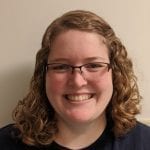About 20% of UConn students are supported by the Center for Students with Disabilities. The true percentage of students who need help is even higher. With so many students who require diverse ways of learning, how can faculty make sure their teaching is adequate, effective and inclusive for all students? In order to address this situation, CLAS has supported the Accessibility Fellowship Program during the 2022-2023 academic year with the goal to study disability and improve the accessibility situation at UConn and generally in higher education. Indeed, research shows that these students can perform at the highest standards in the classroom and in research, if they are given appropriate conditions to do so. One of the fellows in this program was our Dr. Erin Scanlon, Assistant Professor in-Residence at the Avery Point regional campus. The Center for Students with Disabilities makes a difference by addressing aspects related to, e.g., submitting assignments or taking tests. This is important but not enough. Instructors can make an even bigger difference at a much earlier stage, before submitting homework or taking tests, namely while the students learn in the classroom. Small changes in the classroom teaching can significantly improve the performance of the students. Which small changes can faculty implement? A lot is known about this thanks to the research of Dr. Scanlon and other scholars in Physics Education Research (PER) who study the learning needs of students with special needs. For more information on this important topic see the UConn Today news article
Author: Peter Schweitzer
CT Space Grant Award for Andrea Mejia
Second-year graduate student Andrea Mejia received in Fall 2022 the CT Space Grant Award for her Graduate Research on “Constraining Black Hole Binaries and Mergers” where she studies, by means of numerical simulations, how Active Galactic Nuclei form and eventually merge stellar mass black hole binaries, see https://ctspacegrant.org/funding-programs/faculty/past-recipients. In addition, Andrea successfully secured in May 2023 an ACCESS Explore Grant. These grants are designed specifically for graduate students in need of advanced computing and data resources for research purposes. Andrea’s grant provides 716,800 cpu-hours on high-performance computing systems to be used by May 2024. Originating from Andrea’s undergraduate research at her prior institution, Hunter College, this well-funded research will help to interpret data on gravitational waves from black hole mergers observed by LIGO and VIRGO. For her graduate studies at UConn, however, Andrea plans to pursue a different career path and switch from mergers of stellar mass black holes in theoretical astrophysics to collisions of subatomic particles in theoretical particle and nuclear physics.
New Physics Faculty: Erin Scanlon
Erin Scanlon joins our Department in fall 2020 as Assistant Professor in Residence at the Avery Point Campus. Erin comes to UConn with an impressive track record of university teaching experience and scholarship in physics education research (PER).
After earning a master’s degree in physics from Georgia Institute of Technology, Erin joined the faculty at Texas Lutheran University from 2012-2017 where she developed and taught introductory physics courses and the associated labs. In parallel to that, Erin pursued PhD in the developmental education doctoral program at the Texas State University, the only program of its kind in the nation, where she earned her PhD in 2017 receiving the 2018 Texas State University Outstanding Dissertation Award. Subsequently Erin accepted a position as a preeminent postdoctoral scholar at University of Central Florida in the group of Dr. Jackie Chini. Erin is a renowned expert in the field of physics education research. Her research, supported by intra- and extra-mural grants, was published in the top PER and STEM education journals. Recently Erin’s research focused on two main streams: investigating how studio physics is implemented across multiple institutions in the nation, and investigating how to support people with disabilities in STEM fields.
Erin is one of the founding steering committee members of the APS Inclusion, Diversity, and Equity Alliance (APS-IDEA) launched by APS in summer 2020. This new APS initiative is a world-wide alliance to support departments, national labs and other institutions to identify and enact strategies for improving equity, diversity and inclusion which is much needed in physics. APS-IDEA is a great success with currently more than 90 admitted teams including UConn, see the article on APS-IDEA (to avoid conflict of interest our application was not reviewed by Erin). Erin is also the vice chair of the Physics Education Research Leadership and Organizing Council (PERLOC) which is the leadership body for the physics education research community and founded the Conference Accessibility Working Group.
Erin is committed to outreach and initiated at the Texas Lutheran University highly successful outreach events, called Family Physics Night, which brought together members from the university and local community members. Once settled in, Erin is looking forward to start similar outreach and research activities. Erin moved to Connecticut with her husband Matt who is also a scholar in PER and teaches physics at post-secondary level. We are excited to welcome Erin as a physics faculty in our department, and look forward to working with her.

Amelia Henkel, Graduating President of the Undergraduate Women in Physics Club, speaks about her time at UConn

Amelia Henkel, graduating Double Major in Physics and Human Rights, and President of the Undergraduate Women in Physics Club, speaks on the CLAS website about her passion for physics and human rights, and how she mastered challenges in her remarkably interdisciplinary curriculum. “We really need to interact with other disciplines,” says Amelia, “because that’s when physics has the opportunity to make a real impact on the rest of the world.” Her broad research interests range from A to W: from Astronomy to Women’s, Gender, and Sexuality Studies. “Respecting and promoting human rights is a prerequisite to realizing our full potential as human beings,” says Amelia. Physics as a discipline has made progress to become more inclusive, but many groups remain minorities including women. In daily college life in physics departments female students still face “microaggressions and discriminatory practices” which are often unintended and unconscious but nonetheless damaging and frustrating. As the President of the Undergraduate Women in Physics Club, Amelia helped to organize “events that promote community cohesion and inform the students about the nature of some of the barriers that exist in physics and in STEM, while talking about how we can overcome them.” The recent department-wide event Women in Physics Colloquium organized by Amelia was thought provoking and well-received. The percentage of women earning a Bacheleor’s Degree in Physics from UConn, though slowly increasing and compatible with the national average of about 20% published by APS, is far away from where we wish to be. But the efforts of students like Amelia contribute to improving the situation. Many thanks to Amelia whose commitment helps to make our department better.
Read more about Amelia on the CLAS website. A short summary of her story is in UConn Today.